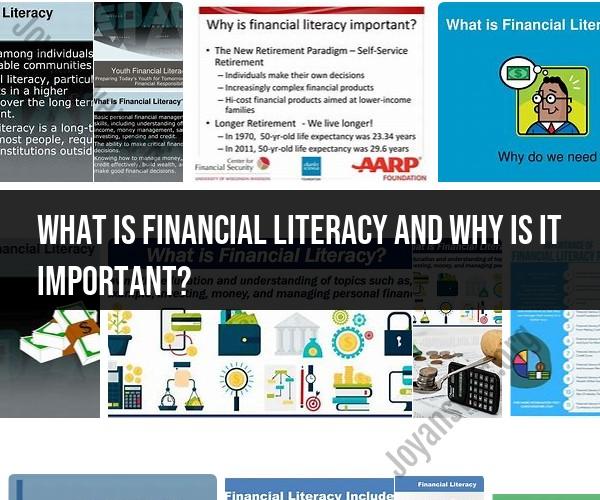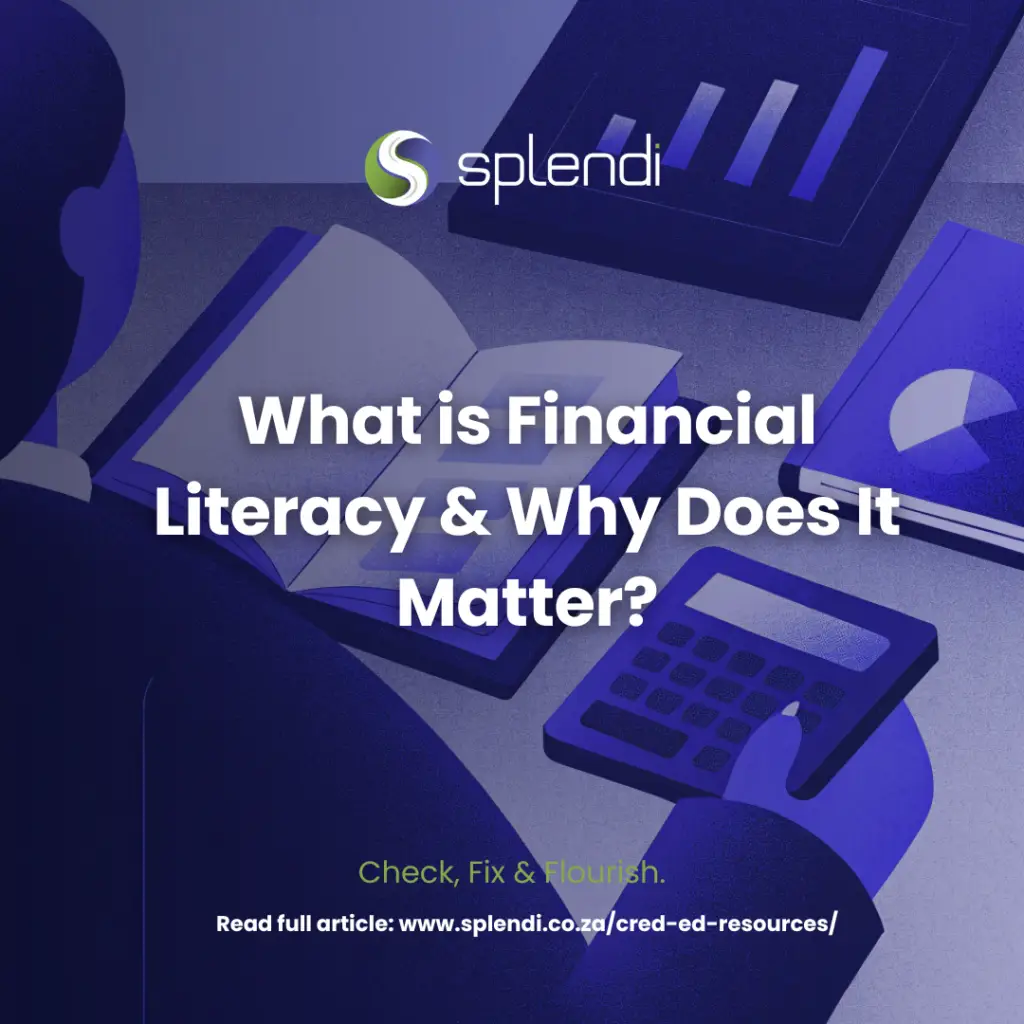
The Essential Guide: What is Financial Literacy and Why Does It Matter for Your Financial Future?
Ever feel overwhelmed when thinking about money? Do terms like "compound interest," "credit score," or "investment portfolio" make your head spin? You’re not alone. For many, the world of personal finance can seem like a complex maze, guarded by impenetrable jargon and endless rules.
But what if you had a map? What if you understood the language of money, not just to survive, but to thrive? That’s where financial literacy comes in – and it’s one of the most powerful skills you can develop for a life of confidence, security, and true freedom.
In this comprehensive guide, we’ll break down what financial literacy truly means, why it’s not just a nice-to-have but an absolute necessity, and how even beginners can start building this vital skill.
What Exactly is Financial Literacy? Your Money Superpower, Explained
At its core, financial literacy is the ability to understand and effectively use various financial skills, including personal financial management, budgeting, and investing.
Think of it as having the knowledge, skills, and confidence to make informed decisions about your money. It’s not about being a millionaire or an economics expert; it’s about having a practical understanding of how money works, how to manage your own, and how to make it work for you.
It’s your money superpower.
Being financially literate means you can:
- Understand your income and expenses.
- Make informed choices about spending and saving.
- Navigate debt wisely (or avoid it altogether).
- Plan for your future, whether it’s a down payment, retirement, or a dream vacation.
- Protect yourself from financial scams and bad decisions.
Key Components of Financial Literacy:
Financial literacy isn’t just one big concept; it’s a collection of interconnected skills. Here are the main pillars:
- Budgeting & Cash Flow Management: This is the foundation. It’s knowing how much money comes in and where it goes. It involves creating a plan for your spending and saving, ensuring you don’t spend more than you earn.
- Saving & Emergency Funds: Understanding the importance of setting money aside for future goals (like a house or education) and, critically, building an emergency fund for unexpected expenses (like a job loss or medical bill).
- Debt Management: Knowing the different types of debt (good vs. bad), understanding interest rates, and developing strategies to manage or eliminate debt effectively. This includes credit cards, student loans, mortgages, and car loans.
- Investing Basics: Learning how to grow your money over time. This involves understanding concepts like stocks, bonds, mutual funds, and the power of compound interest, even if you start small.
- Credit & Credit Scores: Understanding what a credit score is, why it matters (for loans, housing, even jobs), and how to build and maintain good credit.
- Understanding Financial Products: Being able to grasp how bank accounts, loans, insurance policies, and other financial services work, and how to choose the right ones for your needs.
- Risk Management & Insurance: Recognizing potential financial risks (illness, accidents, job loss) and understanding how insurance (health, auto, home, life) can protect you.
- Taxes: Having a basic understanding of how taxes affect your income, spending, and investments.
Why Does Financial Literacy Matter So Much? The Unbreakable Link to Your Well-being
Now that we know what financial literacy is, let’s dive into why it’s so incredibly important. It’s not an exaggeration to say that financial literacy profoundly impacts nearly every aspect of your life.
1. Empowers You to Make Informed Decisions
Without financial literacy, you’re essentially walking blind through a complex financial world. You might make decisions based on emotion, peer pressure, or incomplete information.
- Example: Without understanding interest rates, you might take out a high-interest loan that traps you in debt for years. With financial literacy, you can compare options, understand the true cost, and choose wisely.
- Benefit: You gain control. You move from being a passive participant in your financial life to an active, strategic decision-maker.
2. Reduces Financial Stress and Anxiety
Money worries are a leading cause of stress, relationship problems, and even health issues. When you don’t understand your financial situation or feel like you’re constantly struggling, it takes a heavy toll.
- Example: Living paycheck to paycheck without an emergency fund can cause immense anxiety. A sudden car repair can feel like a catastrophe.
- Benefit: Financial literacy provides a roadmap. Knowing you have a budget, savings, and a plan for debt brings a sense of calm and control. You’ll sleep better at night.
3. Helps You Avoid Debt Traps
Debt can be a powerful tool (like a mortgage to buy a home), but it can also be a crippling burden. High-interest debt, like credit card debt, can quickly spiral out of control, making it impossible to get ahead.
- Example: Many people fall into the trap of minimum payments on credit cards, unknowingly paying thousands in interest over decades.
- Benefit: Financial literacy teaches you to differentiate between "good" and "bad" debt, understand interest rates, and develop strategies to pay off debt efficiently, freeing up your income for other goals.
4. Builds a Secure Future: Saving, Investing, and Retirement
One of the most profound impacts of financial literacy is its ability to transform your future. It’s not just about managing today’s money; it’s about building wealth for tomorrow.
- Saving: Understanding the power of consistent saving, even small amounts, for short-term and long-term goals.
- Investing: Learning how to make your money grow through investments, leveraging the magic of compound interest (where your money earns money, and then that money earns more money!). This is how people build significant wealth over time, even with modest starting amounts.
- Retirement Planning: Realizing that retirement isn’t just for "old people" but requires foresight and consistent action throughout your working life.
- Benefit: You move from simply earning and spending to actively building a nest egg that can provide financial security, fund your dreams, and ensure a comfortable retirement.
5. Protects You from Scams and Fraud
The financial world is rife with scams, phishing attempts, and predatory schemes designed to trick people out of their money.
- Example: Pyramid schemes, fake investment opportunities, or "too good to be true" offers prey on those who lack understanding of legitimate financial practices.
- Benefit: A solid foundation in financial literacy equips you with the critical thinking skills to spot red flags, ask the right questions, and protect your hard-earned money from fraudsters.
6. Achieves Your Financial Goals
What are your dreams? A new car? A down payment on a house? Starting a business? Traveling the world? Sending your kids to college? All of these goals have a financial component.
- Example: You might dream of owning a home but have no idea how much to save, what a mortgage entails, or how long it will take.
- Benefit: Financial literacy helps you quantify your goals, break them down into actionable steps, create a realistic timeline, and track your progress, turning dreams into achievable realities.
7. Contributes to Overall Well-being and Independence
Financial literacy isn’t just about money; it’s about your quality of life. When you’re financially stable and confident, you have more choices, more opportunities, and more freedom.
- Independence: You’re not reliant on others or trapped in situations you don’t want to be in due to financial constraints.
- Opportunity: You can seize new opportunities, whether it’s changing careers, pursuing education, or taking a sabbatical.
- Legacy: You can potentially build a legacy for your family or contribute to causes you care about.
- Benefit: Financial literacy unlocks a higher level of personal autonomy and empowers you to live life on your own terms.
Key Pillars of Financial Literacy: What You Need to Know (and Do!)
Let’s dive a little deeper into the actionable components of financial literacy. Mastering these areas will significantly boost your financial health.
1. Budgeting & Tracking Your Spending
- What it is: Knowing exactly where your money comes from and where it goes. It’s creating a spending plan that aligns with your income and goals.
- Why it matters: It’s the first step to gaining control. You can’t manage what you don’t measure. A budget helps you identify wasteful spending, find extra money for savings, and ensure you’re living within your means.
- How to start: Use a spreadsheet, a budgeting app (like Mint, YNAB, or Rocket Money), or even pen and paper. Categorize your expenses and review them regularly.
2. Building an Emergency Fund & Saving for Goals
- What it is: Setting aside money specifically for unexpected events (like job loss, medical emergencies, car repairs) and for planned future expenses (like a down payment, vacation, or education).
- Why it matters: An emergency fund acts as a financial safety net, preventing you from going into debt when life throws a curveball. Saving for goals makes them achievable without relying on high-interest loans.
- How to start: Aim for 3-6 months of essential living expenses in an easily accessible savings account for your emergency fund. Automate savings transfers from your checking account to a separate savings account.
3. Understanding and Managing Debt
- What it is: Differentiating between "good" debt (like a mortgage for an appreciating asset or a student loan for career advancement) and "bad" debt (high-interest credit card debt for depreciating goods). It also involves understanding interest rates, loan terms, and repayment strategies.
- Why it matters: Mismanaged debt can be a heavy chain, limiting your financial freedom and opportunities. Smart debt management frees up your cash flow.
- How to start: List all your debts, their interest rates, and minimum payments. Prioritize paying off high-interest debt first (e.g., using the "debt snowball" or "debt avalanche" method). Avoid taking on new debt unnecessarily.
4. The Basics of Investing
- What it is: Putting your money to work so it can grow over time, often through vehicles like stocks, bonds, mutual funds, or ETFs. It’s leveraging the power of compounding.
- Why it matters: Inflation erodes the value of your cash over time. Investing allows your money to outpace inflation and build substantial wealth for retirement or other long-term goals.
- How to start: Start small. Understand basic concepts like diversification (don’t put all your eggs in one basket) and long-term growth. Consider low-cost index funds or ETFs. Many robo-advisors make investing accessible for beginners.
5. Building and Maintaining Good Credit
- What it is: Your credit score is a numerical representation of your creditworthiness. It’s based on your borrowing and repayment history. Good credit means you pay bills on time and manage debt responsibly.
- Why it matters: A good credit score is essential for getting favorable interest rates on loans (mortgages, car loans), renting an apartment, and sometimes even for jobs or insurance premiums.
- How to start: Pay all your bills on time, every time. Keep credit card balances low (below 30% of your limit). Avoid opening too many new credit accounts at once. Regularly check your credit report for errors.
How to Improve Your Financial Literacy: Practical Steps for Beginners
The good news is that financial literacy is a learned skill, not an inherited trait. Anyone can improve their money knowledge, regardless of their current situation.
Here’s how you can start your journey:
-
Read, Read, Read!
- Books: Start with classics like "The Total Money Makeover" by Dave Ramsey (for debt payoff), "The Psychology of Money" by Morgan Housel (for mindset), or "I Will Teach You To Be Rich" by Ramit Sethi (for automation).
- Blogs & Websites: Follow reputable financial blogs, news sites, and educational platforms. Look for sources that provide clear, unbiased information.
- Articles: Like this one! Keep seeking out information on topics you don’t understand.
-
Take Advantage of Free Resources
- Online Courses: Many universities and financial institutions offer free or low-cost online courses on personal finance basics (e.g., Coursera, edX, Khan Academy).
- Library: Your local library is a treasure trove of financial books, magazines, and even workshops.
- Government & Non-Profit Sites: Organizations like the Consumer Financial Protection Bureau (CFPB) offer excellent, unbiased resources.
-
Start Small and Practice Consistently
- Don’t try to master everything at once. Pick one area (like budgeting or saving for an emergency fund) and focus on it until you feel confident.
- Apply what you learn: Knowledge without action is useless. If you learn about budgeting, create one. If you learn about saving, set up an automatic transfer.
-
Automate Your Finances
- Set up automatic transfers from your checking account to your savings and investment accounts. This makes saving consistent and effortless.
- Automate bill payments to avoid late fees and protect your credit score.
-
Talk About Money (Responsibly)
- Discuss financial goals and challenges with trusted friends, family, or a partner. This can provide new perspectives and accountability.
- Be cautious about getting financial advice from unqualified sources.
-
Consider Professional Guidance (When Ready)
- As you advance, a certified financial planner can help you with complex financial planning, investment strategies, and retirement planning. Make sure they are fiduciaries (legally obligated to act in your best interest). For beginners, focus on self-education first.
-
Be Patient and Persistent
- Financial literacy is a lifelong journey, not a destination. You’ll constantly learn new things and adapt to changing circumstances.
- There will be setbacks. Don’t get discouraged. Learn from mistakes and keep moving forward.
Conclusion: Your Journey to Financial Empowerment Starts Now
Financial literacy isn’t about becoming rich overnight; it’s about cultivating a deep understanding of money, so you can make smart decisions that lead to lasting financial well-being. It’s about feeling confident, secure, and empowered in your financial life, rather than stressed or confused.
By investing in your financial education, you’re not just learning about numbers; you’re investing in your future, your peace of mind, and your ability to live the life you truly desire.
So, take that first step today. Pick one area from this guide that resonates with you, learn more about it, and put that knowledge into action. Your financial future will thank you.


Post Comment